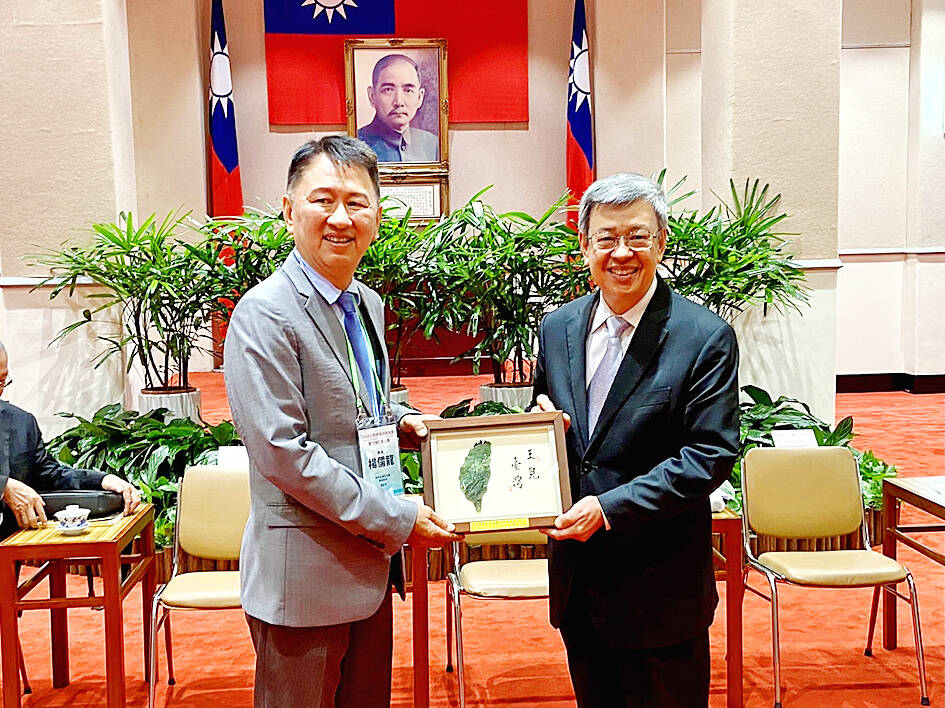Premier Chen Chien-jen (陳建仁) has reiterated the government’s goal to have up to 47,000 overseas compatriot students stay on in Taiwan after graduation by 2030 in a bid to boost the nation’s workforce.
During a meeting with a visiting delegation from the World Federation of Taiwan Alumni Associations on Tuesday last week, Chen said that alumni from different school and university tiers in Taiwan, living or staying in Taiwan, play an important role in promoting exchanges between Taiwan and their home countries.
As such, the Cabinet last year approved a 2023-2026 plan formulated by the Overseas Community Affairs Council (OCAC) to enhance the cultivation and retention of overseas compatriot students, with the goal of retaining up to 47,000 individuals in Taiwan for employment by 2030, with the aim of maintaining Taiwan’s economic growth momentum, Chen said.

Photo: CNA
Under the policy, to maximize the development and retention of overseas compatriot students, the government has adopted new measures to make their enrollment more flexible, including encouraging schools to establish special study programs for international students.
Other measures include expanding industry-academia collaborative education programs for overseas compatriot students and transforming the Overseas Youth Vocational Training Program into two-year associate degree programs.
The government has also relaxed requirements to stay and work after graduation, including allowing overseas compatriot students who have obtained an associate degree or above in Taiwan to apply through their employers to become intermediate-skilled workers in Taiwan, which grants them exemption from certain requirements such as work experience.
Students on short-term study programs are also allowed to remain and work in Taiwan under certain conditions.
Chen said that since the government introduced its New Southbound Policy in 2016 to strengthen relations with its neighbors to the south, from South and Southeast Asia to Australia and New Zealand, many Taiwanese enterprises have pinned their hopes on overseas compatriot students remaining in Taiwan after graduation to help expand their international markets.
Since the implementation of the overseas compatriot education policy over 70 years ago, more than 170,000 overseas compatriot alumni have graduated from different school and university tiers in Taiwan, the council said.
The number of overseas compatriot students who remain in Taiwan after finishing their studies or programs in universities and colleges has increased from 2,000 in 2020, to 4,000 in 2021, 6,000 in 2022, and is expected to reach 8,000 this year, the council added.
The council on its Web site defines an “overseas compatriot student” as a person of Taiwanese or Chinese descent who “has come to Taiwan to study, who was born and lived overseas until the present time, or who has been living overseas for six or more consecutive years in the immediate past and obtained permanent or long-term residency status overseas.”

Chinese Nationalist Party (KMT) Chairman Eric Chu (朱立倫), spokeswoman Yang Chih-yu (楊智伃) and Legislator Hsieh Lung-chieh (謝龍介) would be summoned by police for questioning for leading an illegal assembly on Thursday evening last week, Minister of the Interior Liu Shyh-fang (劉世芳) said today. The three KMT officials led an assembly outside the Taipei City Prosecutors’ Office, a restricted area where public assembly is not allowed, protesting the questioning of several KMT staff and searches of KMT headquarters and offices in a recall petition forgery case. Chu, Yang and Hsieh are all suspected of contravening the Assembly and Parade Act (集會遊行法) by holding

PRAISE: Japanese visitor Takashi Kubota said the Taiwanese temple architecture images showcased in the AI Art Gallery were the most impressive displays he saw Taiwan does not have an official pavilion at the World Expo in Osaka, Japan, because of its diplomatic predicament, but the government-backed Tech World pavilion is drawing interest with its unique recreations of works by Taiwanese artists. The pavilion features an artificial intelligence (AI)-based art gallery showcasing works of famous Taiwanese artists from the Japanese colonial period using innovative technologies. Among its main simulated displays are Eastern gouache paintings by Chen Chin (陳進), Lin Yu-shan (林玉山) and Kuo Hsueh-hu (郭雪湖), who were the three young Taiwanese painters selected for the East Asian Painting exhibition in 1927. Gouache is a water-based

Taiwan would welcome the return of Honduras as a diplomatic ally if its next president decides to make such a move, Minister of Foreign Affairs Lin Chia-lung (林佳龍) said yesterday. “Of course, we would welcome Honduras if they want to restore diplomatic ties with Taiwan after their elections,” Lin said at a meeting of the legislature’s Foreign Affairs and National Defense Committee, when asked to comment on statements made by two of the three Honduran presidential candidates during the presidential campaign in the Central American country. Taiwan is paying close attention to the region as a whole in the wake of a

OFF-TARGET: More than 30,000 participants were expected to take part in the Games next month, but only 6,550 foreign and 19,400 Taiwanese athletes have registered Taipei city councilors yesterday blasted the organizers of next month’s World Masters Games over sudden timetable and venue changes, which they said have caused thousands of participants to back out of the international sporting event, among other organizational issues. They also cited visa delays and political interference by China as reasons many foreign athletes are requesting refunds for the event, to be held from May 17 to 30. Jointly organized by the Taipei and New Taipei City governments, the games have been rocked by numerous controversies since preparations began in 2020. Taipei City Councilor Lin Yen-feng (林延鳳) said yesterday that new measures by